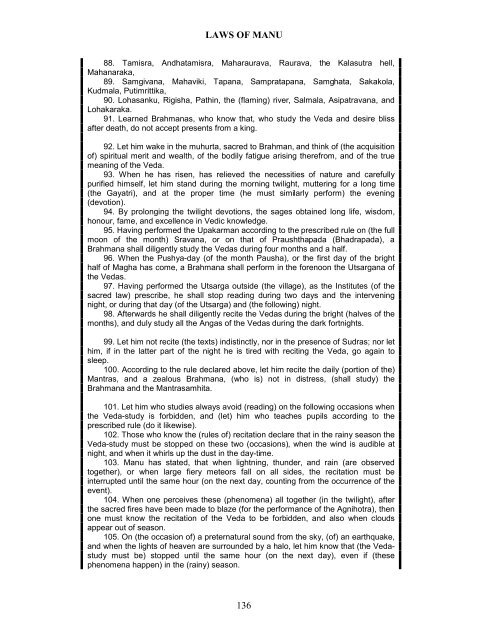Create successful ePaper yourself
Turn your PDF publications into a flip-book with our unique Google optimized e-Paper software.
LAWS OF MANU<br />
88. Tamisra, Andhatamisra, Maharaurava, Raurava, the Kalasutra hell,<br />
Mahanaraka,<br />
89. Samgivana, Mahaviki, Tapana, Sampratapana, Samghata, Sakakola,<br />
Kudmala, Putimrittika,<br />
90. Lohasanku, Rigisha, Pathin, the (flaming) river, Salmala, Asipatravana, and<br />
Lohakaraka.<br />
91. Learned Brahmanas, who know that, who study the Veda and desire bliss<br />
after death, do not accept presents from a king.<br />
92. Let him wake in the muhurta, sacred to Brahman, and think of (the acquisition<br />
of) spiritual merit and wealth, of the bodily fatigue arising therefrom, and of the true<br />
meaning of the Veda.<br />
93. When he has risen, has relieved the necessities of nature and carefully<br />
purified himself, let him stand during the morning twilight, muttering for a long time<br />
(the Gayatri), and at the proper time (he must similarly perform) the evening<br />
(devotion).<br />
94. By prolonging the twilight devotions, the sages obtained long life, wisdom,<br />
honour, fame, and excellence in Vedic knowledge.<br />
95. Having performed the Upakarman according to the prescribed rule on (the full<br />
moon of the month) Sravana, or on that of Praushthapada (Bhadrapada), a<br />
Brahmana shall diligently study the Vedas during four months and a half.<br />
96. When the Pushya-day (of the month Pausha), or the first day of the bright<br />
half of Magha has come, a Brahmana shall perform in the forenoon the Utsargana of<br />
the Vedas.<br />
97. Having performed the Utsarga outside (the village), as the Institutes (of the<br />
sacred law) prescribe, he shall stop reading during two days and the intervening<br />
night, or during that day (of the Utsarga) and (the following) night.<br />
98. Afterwards he shall diligently recite the Vedas during the bright (halves of the<br />
months), and duly study all the Angas of the Vedas during the dark fortnights.<br />
99. Let him not recite (the texts) indistinctly, nor in the presence of Sudras; nor let<br />
him, if in the latter part of the night he is tired with reciting the Veda, go again to<br />
sleep.<br />
100. According to the rule declared above, let him recite the daily (portion of the)<br />
Mantras, and a zealous Brahmana, (who is) not in distress, (shall study) the<br />
Brahmana and the Mantrasamhita.<br />
101. Let him who studies always avoid (reading) on the following occasions when<br />
the Veda-study is forbidden, and (let) him who teaches pupils according to the<br />
prescribed rule (do it likewise).<br />
102. Those who know the (rules of) recitation declare that in the rainy season the<br />
Veda-study must be stopped on these two (occasions), when the wind is audible at<br />
night, and when it whirls up the dust in the day-time.<br />
103. Manu has stated, that when lightning, thunder, and rain (are observed<br />
together), or when large fiery meteors fall on all sides, the recitation must be<br />
interrupted until the same hour (on the next day, counting from the occurrence of the<br />
event).<br />
104. When one perceives these (phenomena) all together (in the twilight), after<br />
the sacred fires have been made to blaze (for the performance of the Agnihotra), then<br />
one must know the recitation of the Veda to be forbidden, and also when clouds<br />
appear out of season.<br />
105. On (the occasion of) a preternatural sound from the sky, (of) an earthquake,<br />
and when the lights of heaven are surrounded by a halo, let him know that (the Vedastudy<br />
must be) stopped until the same hour (on the next day), even if (these<br />
phenomena happen) in the (rainy) season.<br />
136


















